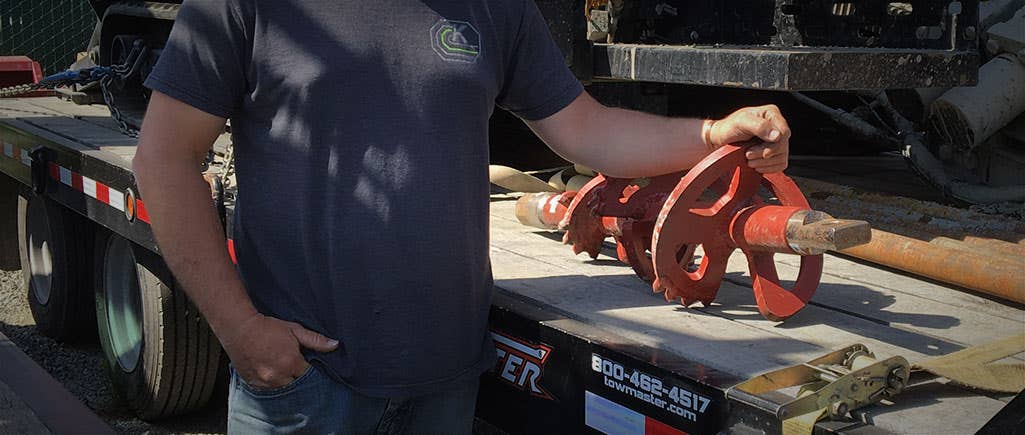
A directional boring backreamer is essential to any HDD job. Not only do you need a reamer that will cut the desired diameter, but you also need one that will aid in removing the cuttings from the hole. If you cut a 24" hole, but half of it is full of the cuttings, you’re going to have a tough time pulling in the 16" pipe. As a driller, it might be tempting to try to save money by cutting corners with a cheaper or smaller reamer, but this can lead to costly breakage and time for repairs, wrecking the whole operation! Truthfully, the best way to save time and money is proper maintenance. We've answered some questions about back reaming in the past, but now we'll show you how to keep your directional drilling backreamer in the best shape possible.
Get the Right Backreamer for the Job
Maintenance won't mean much if you're using the wrong tool, to begin with. Choosing the right backreamer for each job is incredibly important, and sharing across rigs is not a good idea. Simply put, the wrong HDD tools could cost you in the long run. Pay attention to the following to ensure you get the most life out of your directional boring backreamer:
- Know the ground conditions you'll be drilling in so your reamer has the appropriate mixing and cutting action.
- Match the backreamer design to the power of the drill rig — A reamer designed for a rig rated at 4,000 ft-lb torque should not be used on a rig with 10,000 ft-lb of torque; it'll rip the blades off or break the shaft.
- Be willing to swap out the reamer or make changes if necessary.
Keep Track of Wear and Tear
Once you have the proper backreamer, you'll want to visually inspect it after every drilling job to keep it in top form. Note common problems, such as:
- Deviations or cracks
- Reduced diameter of the shaft and thread adapters
- Wear, galling, or dirt on the threads
- Cracked or missing cutter teeth that leave areas exposed
On a well-designed backreamer, the cutters should cover each other for smooth cutting operation and less wear on the body. If some cutters are missing, the remaining cutters have to work harder. In turn, this means the drill rig itself has to work harder, slowing down progress. It can also lead to more wear on the reamer body or shaft, reducing the life of the tool. It's best to keep an ongoing checklist, complete with before and after photos, so you can track any issues with your backreamer and address them before things get worse. To help reduce wear and tear on the threads, consider using plastic or steel protectors between HDD jobs.
Clean Your Reamer Regularly
After every job, it's important to clean your reamer. Sand, dirt and other debris are bound to build up which can shorten the lifespan of your tool if unattended. Drilling fluid can also solidify in ports, so make sure to wash those as well.
Use the Proper Mixture and Amount of HDD Fluid
Each directional drilling backreamer needs strong mixing and pumping action. The mixing action mixes the drill fluid with the cuttings. The pumping action, along with the proper volume and mixture of fluid, will suspend the cuttings and carry them out of the hole. For unstable ground conditions like sand and gravel, a bad fluid mix that doesn't suspend the ground can cause excessive wear. Pay attention to fluid pressure as well — too much pressure can result in overcutting or washing out the hole. Back reaming requires a lot of drill fluid, sometimes called "mud." When used correctly, it will extend your reamer's life by quite a bit and lead to successful utility installation.
Replace Your Reamer When the Time Comes
Everything has a lifespan, and backreamers for directional boring are no exception. While replacement parts may be available in some cases, trying to extend the use of a tool beyond its capability is never a good idea. You could end up breaking your reamer on the job, leading to unnecessary downtime and setup. Instead, keep a backup on hand, and be ready to swap out your backreamer when it's necessary.
Find Your Next Directional Boring Backreamer at Melfred Borzall
With all of our experience in the HDD industry, you know you can count on Melfred Borzall for high-quality reamers that will last. With the proper care, you'll have a backreamer that will do its job — and then some! If you're unsure as to which reamer is best suited for your particular job, or you have an unusual underground installation problem, give us a call. One of our HDD experts will help you come up with the best solution.
